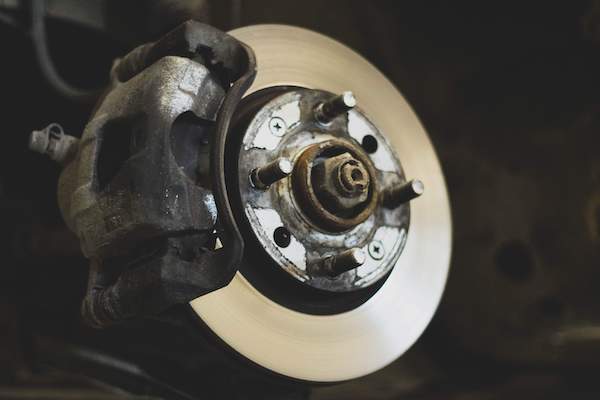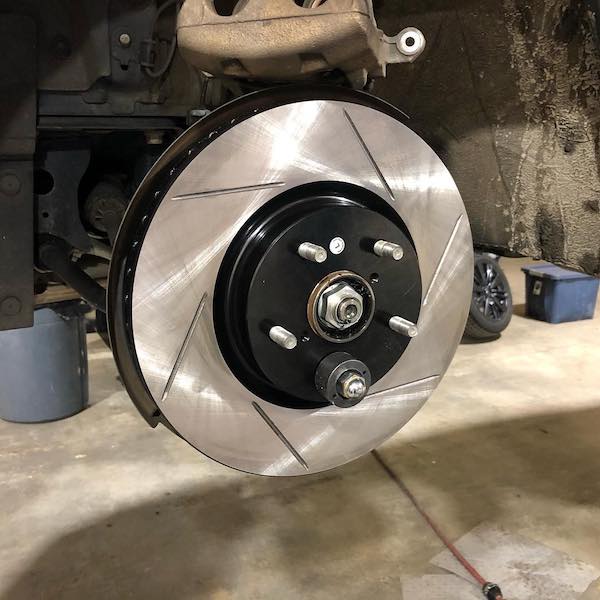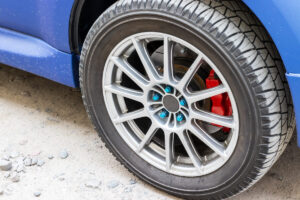If your brake rotors are malfunctioning or you just haven’t changed them in a long time, you may wonder when you should be replacing them. If you don’t have experience with them, it can be challenging to know if your rotors are the problem or it’s something else like brake pads. How exactly do you know when it is time to replace your brake rotors?
It would be best if you considered replacing your brake rotors when they begin making loud squeaking/scraping sounds or when they reach the end of their average lifespan. You can also look for scratches on the disc itself. It’s important that you replace them quickly because they could present a safety hazard.
If you’d like to find out if it’s time to replace your brake rotors, we’ve got you covered. First, we’ll explore exactly what brake rotors are and how they differ from other parts like brake pads. Then we will arm you with all the tools you need to figure out if your brake rotors are ready for replacement.
Symptoms of Bad Rotors
There are several related symptoms ranging from noisy brakes to scratches on the disc itself that may tell you your brake rotors are beginning to wear down. Some of them should be immediately obvious, while others require that you visually inspect the rotors themselves.
Below are the three most common signs that your brake rotors are beginning to wear out:
- Your brakes suddenly start sounding louder and louder: When they first start wearing down, brake rotors torque and disk thickness change a little too much and begin producing a squeaking sound when you brake. If they aren’t replaced, that sound will get louder until it’s more like a loud scrape.
- You find long scratches and grooves on the rotor itself: If you visually inspect your brake rotors, you can look for long scrape marks on its surface. These are caused by changes in the torque and disk thickness variation of your rotors over time coupled with no longer perfectly fitting with the brake pads.
- You begin to feel vibrations when you brake: If your brakes seem almost to vibrate from the pedal to your foot when you press them, chances are small changes to its size and shape coupled with normal wearing have run their course.

Brake Rotors & Brake Pads 101
So what exactly are brake rotors, and how does their definition differ from that of brake pads? What functions do they perform in conjunction with one another? To answer these questions, we must first define exactly what brake rotors and brake pads are on a technical level.
- Brake Rotors: Brake rotors are metal discs that attach to your car’s axle and turn with your wheels when you’re driving.
- Brake Pads: Brake pads sit in the brake caliper and provide friction to stop your brake rotors from spinning.
What’s the Difference Between Pads and Rotors
Because of their overlapping functions, many people sometimes confuse pads and rotors for being the same thing. In reality, they are not. Though they’re involved in similar processes, they both have different basic functions.
The major differences between the brake pad and brake rotors include:
- They’re made from different materials: Rotors are usually made of carbon ceramics or steel. Brake pads, on the other hand, are made out of anything from a combination of steel, copper shavings, brass/resin, and graphite. The brake pads are meant to create friction, whereas the rotors are meant to make things move.
- One turns with the wheels while the other helps stop them: Rotors turn with your wheels as your car moves, whereas brake pads are meant to clamp down on the rotors to stop your wheels from turning.
How Brake Rotors and Brake Pads Work Together
So now that we know some of the key differences between brake pads and brake rotors, let’s explore how exactly they work together. The knowledge of how they are meant to function correctly can be a useful tool for spotting problems.
Brake pads and brake rotors both work together to keep the wheels of your car spinning when they should and braking when they should. The rotors themselves are there to spin with the wheels. When you want to stop the car, they provide something for your brake pads to clamp onto, thus stopping the wheels from turning.
To be effective, the rotors have to maintain a specific form so that they fit with the brake pads. Scratching and wearing can lead to them no longer fitting nicely with the brake pads.
At the same time, the brake pads need to maintain a certain level of friction to be effective.

Common Misconceptions of Brake Rotors and Brake Pads
Like with anything, there are many misconceptions of both brake rotors and brake pads that are prevalent even today. Unfortunately, if you base your assessment on whether or not you need to replace yours on a false idea about how they work, you are likely to make a mistake.
Below are the three biggest misconceptions people have about brake pads and brake rotors.
- Bad brake pads are what cause noises from your brakes: Often, when people hear strange noises when they break, they assume their brake pads have gone bad. In reality, however, the rotors could just be wearing down, and they may be the real culprit behind the noises you’re hearing.
- Brake Rotors Warp: While there’s nothing wrong with calling what happens to brake rotors overtime warping, it’s not technically what is happening. Instead, tiny changes to the torque and disk thickness cause it to interact improperly with the brake pads. These phenomena are known as torque variation and disk thickness variation.
- Lube will solve your brake noise problems: Many people have found that when their brakes start making loud noises, they can just put lube around the brake pads area and the sound stops; for a while. This is actually a bad idea as it can melt and damage what it’s touching as well as attract more dirt and debris.
How Long Do Brake Rotors Last
Generally, your brake rotors could last you anywhere between 30,000 to 70,000 miles. It’s important to keep track of how much you’ve driven since you replaced them so that you know when you should be checking them a little more often.
If you haven’t had yours for 30,000 miles yet but it starts making noises or causing vibrations in your brakes anyway, you should still check it. Never treat the average amount of miles they can last as an absolute certainty because other factors like what type of car you drive, or if you have to drive in bad conditions often, can speed up the process of their lifespan.
So Really, When Should I Replace My Brake Rotors?
You should replace your brake rotors at the first sign of wearing or when it’s getting closer to the end of their average lifespan. In theory, you could wait until they wear down a little more, but that’s not a good idea because bad rotors present a safety hazard. If you’re going to replace them anyway, you might as well do it when it’s safe.
Remember that your brake pads depend on your brake rotors in order to work. If they both were to stop, you would just keep rolling, and nobody wants that. So next time you hear a wear squeak or a scraping sound coming from your brakes that you should first check your rotors. If there are scratches or normal wear and tear on them, it’s time to get some new ones!
If you are experiencing any of the symptoms mentioned above, give us a call at (501) 214-1091 to have your brake rotors checked out in the Little Rock area!



